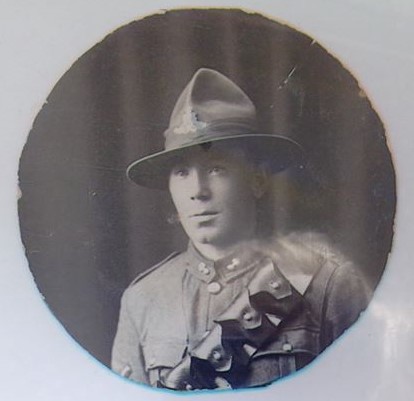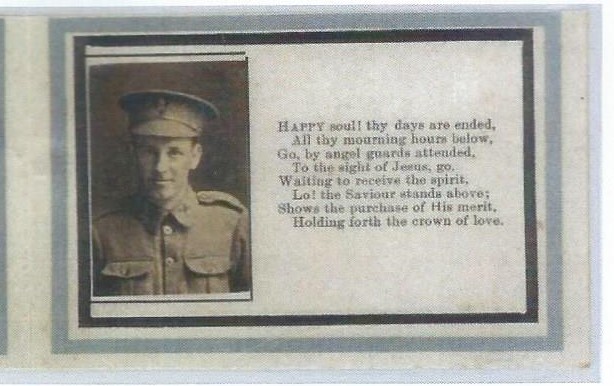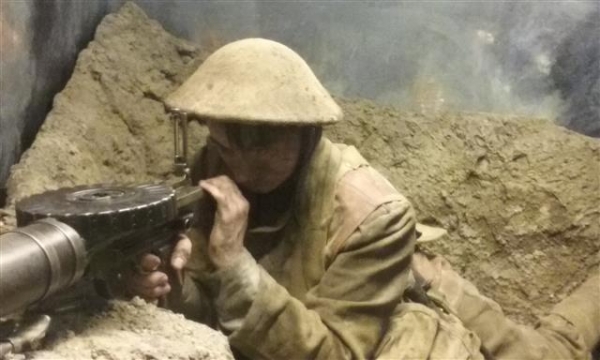I was correct in thinking that none of my direct ancestors were the right age for enlistment, but it occurs to me that, due to the tragic nature of The Great War, most people of European descent actually have many relatives who fought in the war. This is, I have found, true for my family.
So, let me recount to you my last month or so of researching (an abbreviated version, don’t worry…). My first port of call was to talk with my grandparents. I learnt a little more about my Nana’s uncles who went to war. The first died of sickness in Europe, after the war had actually finished, and the second returned with a horrendous case of mustard gas poisoning. Neither fought at the Somme, so I hope to uncover their stories another day. My Granddad didn’t know of any family members who served in the war, but he did go off on an interesting tangent (the joys of speaking with grandparents :D ) about his father joining the army at the end of the first world war (not being called for active service), and other details about his family right up until they moved to New Zealand from India in about 1948. I was surprised to learn that he had an uncle who was a pilot in the second world war and was shot down. Anyway, very interesting, but back on track Granddad. World War One.
Next, I visited Gran who pulled out some of our family documents for me - family trees, newspaper articles, photos etc. We found the names of a few men who fought in the war, but one in particular stood out. Frederick Reginald Ashworth, aged 23 years old, was killed in France on 15th September 1916 – the first day the New Zealanders joined the Battle of the Somme; the very day us Young Ambassadors are travelling to France to commemorate this year. My next question was: “so Gran, how is this man related to us?”. I didn’t know of any Ashworths in our family, and neither did she, apparently. This name on a scrap piece of paper meant little to us as we struggled to connect him on any of the family trees. I wanted to find out about Frederick knowing how we might have been related. And we must have been related… why else would Gran have his name?
I started to do some research about this man, using websites I had been directed to by a woman from the Wainuiomata Valley RSA in Wellington, who I had gotten in touch with. Struggling to read the handwriting from a mere 100 years ago, I discovered some more information about Frederick. He died from wounds on the battlefield. He wasn’t taken to a hospital; he didn’t receive treatment. Perhaps Frederick died straight away. Perhaps he lay amidst the chaos of an Allied assault, dying on the muddy ground, bullets flying over his head, men running past. Probably he was shot. The machine gun was used by both sides but was adopted most readily and efficiently by the Germans. Best used as a defensive weapon, it was terrifyingly effective in gunning down hundreds and thousands of Allied men. Or perhaps his body simply didn’t exist anymore after been blown to the sky by a mortar shell. Either way, he has no known grave. Most of the bodies from the four-and-a-half month 1916 Battle of the Somme were not able to be retrieved until the war ended, two years later. And you can imagine what would have been left after that time had passed... Frederick is commemorated at the Caterpillar Valley Cemetery in Longueval, France. We will be travelling there in September, so I hope to honour him by laying a token, perhaps a poppy.
So, back to my investigation… was he actually a relative of mine?
On one particular website, which itself was not very helpful to me, I found a comment written by a woman who was titled ‘Other Relative’. I clicked on ‘contact’ and her e-mail address came up. And you’ll never guess… (this is actually pretty crazy cool) her last name was Humm! Okay, so that probably means nothing to you... My Gran’s maiden name is Humm. I sent the lady an e-mail, explaining who I was and what I was doing. And I eagerly awaited her reply.
So, this is where the story gets EVEN better (hard to imagine, I know….). She replied to me two days later, calling herself (and I quote) a “keen genealogist”. Well that’s a handy person to be in contact with while searching family history! As it turns out, she can date my family lineage back to William Hum (1784 – 1837) in Essex! She kindly sent me an extensive list of his descendants, of which my Gran was one. So…. I eventually figured out that Frederick was the cousin of my Gran’s mother. In other words, he’s my great-great-great cousin. I don’t even know if that’s a real thing… how about: he was the cousin of my great grandmother (this whole family history thing gets really confusing!).
I also found out about some other men related to us. Frederick and his brother, John Morrison Ashworth, both enlisted for the war. His brother, however, died in training on the 12/7/1918 in Featherston Army Training Camp’s hospital, from cerebro-spinal meningitis at age 20. The war was ended just four months later. I also found that their cousin, Thomas Leslie Gabbatis, died of wounds in France on 10/6/1917. He was just 22.
It has been very moving for me to find this out about my relatives. The Great War really isn’t some war in a faraway land, a forgettable time ago. No, it isn’t possible to remember every war in history, and commemorate every fallen warrior. But the soldiers who fought in the Great War were only three generations ago. We have photos of them. Many families still have letters from them. The extensive effects of the Great War still echo strongly today, whether we realise it or not.
If you would like to find out about your relatives (and I recommend that you do, especially if you still have grandparents around to talk to about it) you can enter their names into these websites:
https://www.archway.archives.govt.nz/SimpleSearchResults.do
http://www.aucklandmuseum.com/war-memorial/online-cenotaph/search/
http://www.cwgc.org/find-war-dead.aspx?cpage=1 (This one is only for those who died in the war).
I would like to take the opportunity to sincerely thank all of our sponsors for this incredible opportunity, including the Tasman District Council for sponsoring me personally. This trip would not be possible without your support.
Please continue reading my blogs, as I hope to post more about these men.
Au revoir!
(P.S. On another note, it is now exactly one month until we go to France! :D )
In honour of Norman Allan McPhee (top), and Frederick Reginald Ashworth (bottom).




